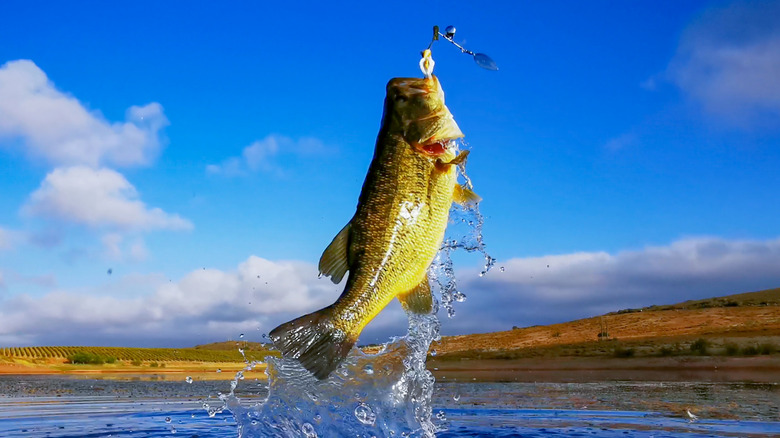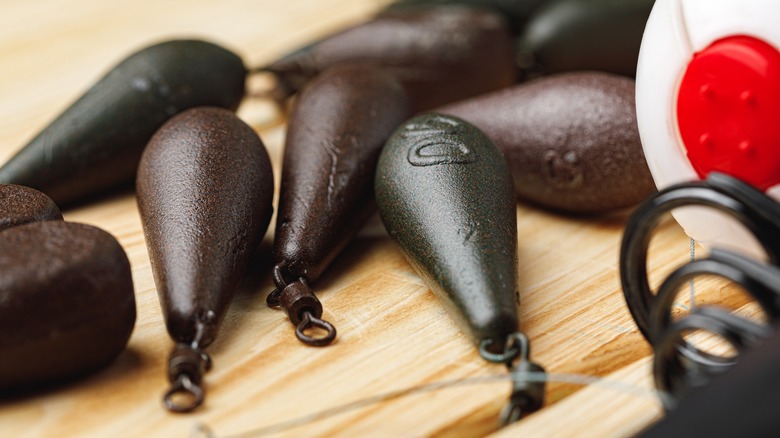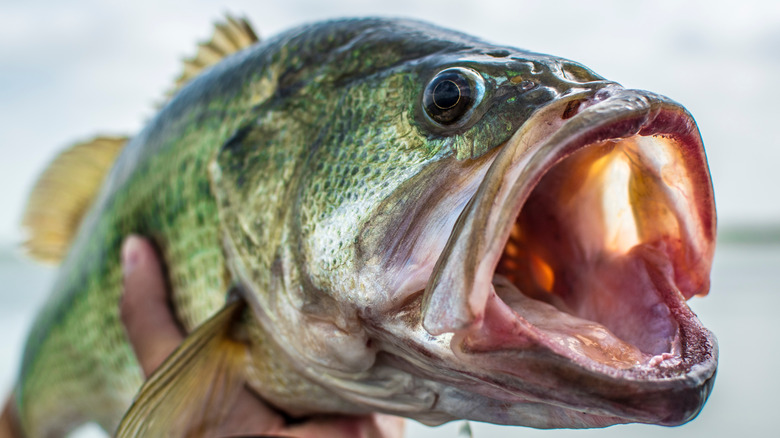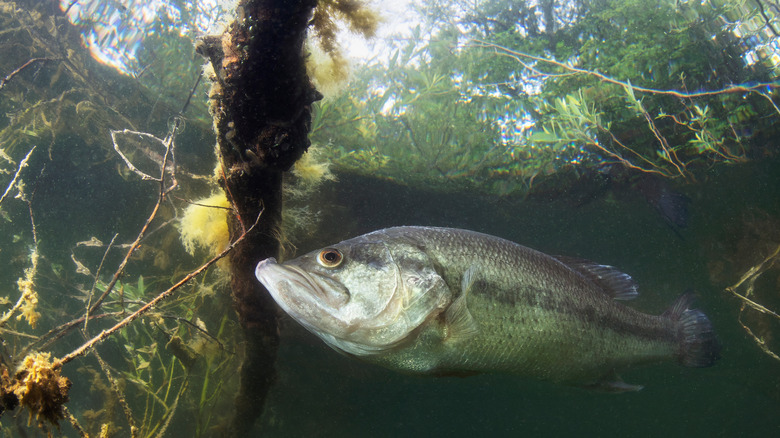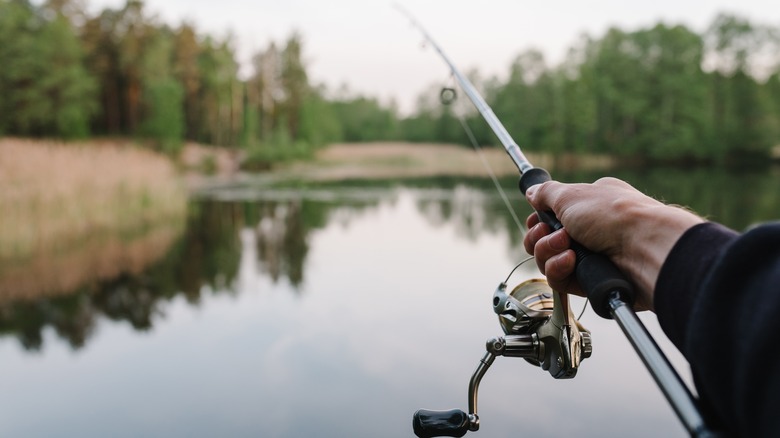The Dramatic History Of Cheating In Fishing Contests
Content warning: The following article contains mentions of animal abuse.
Fishermen's tales are not known for being the most accurate recounts. You may find local anglers boasting about a 30-pound largemouth bass they wrestled and lost (conveniently just around the lake's bend, out of eyeshot from anyone who could testify). Or maybe, you've heard an old skipper in a nearby pub, rattling off the epic tale of the time a Great White almost capsized their ship in a fight for the ages — when realistically, they're embellishing the memory of the time they fished for sand sharks just off the coast.
The lore of mermaids might not have even existed if drunken, love-starved sailors through the centuries didn't mistake manatees for them (via Smithsonian). But lying in fishing gets a bit more devious than confident tales of nautical triumph and women with fins. In today's fishing competitions, thousands of dollars could be unjustly won every time a competing angler is less than honest, and you won't believe some of the heists they've pulled to ensure that happened.
It's a reel problem, and here's why
Professional fishermen all over the world compete in tournaments for an array of prizes – from shotguns to bikes, and bragging rights to boats (via WBUR). The true spoils of (fishing) wars, however, is cash, and lots of it. While some local fishing tournaments grant first prize winners bundles of hundreds or thousands, some payoffs could buy a house — or even better, a new houseboat to fish off of.
The Bassmaster Classic, which took place in Lake Hartwell, South Carolina this year (via Anderson SC Living), can be likened to the Super Bowl of bass fishing. It started back in 1971 in Lake Mead, Nevada (via Bassmaster), when fisherman Bobby Murray won just $10,000 (via ESPN). In 2022, the first place winner reels in a whopping $300,000 (via the Greenville Journal). After over 50 years of righteous winnings, what if someone who didn't deserve it took home the title?
Beefing up the fish
Cheating has become an increased worry in the world of competitive fishing (via WBUR). Unethical fishermen use ingenious tactics to haul in heavier catches, scoring thousands of dollars other anglers fished hard and fairly to earn. One way fishermen have cheated is by weighing down the fish by inserting foreign objects (via The Washington Post). Just a few weeks ago, in the annual Lake Erie Walleye Trail fishing tournament, which has taken place on various lakes over the last 20 years, two fishermen were caught beefing up their fish.
On September 30, anglers Jacob Runyan and Chase Cominsky weighed in walleyes that didn't look quite right to Jason Fischer, the director of the tournament. The fish also weighed in much heavier than they appeared to actually be. Upon cutting open the (already dead) fish, Fischer found 10 egg-sized, steel weights, along with filets of other walleyes that were stuffed down the throats of the catches to make them weigh more. The fraudulent duo would have won nearly $30,000 had they not been caught and disqualified, and having won several other sub-competitions throughout the tournament, they would've also won the overall prize and title. Instead, they were met with rabid disdain from their fellow fishermen and near-violence Fischer had to fend off.
Cheaters are going to cheat
While some competitors have altered their catches, others have recruited foreign fish. Some anglers keep containers of "lunkers" — big fish — out on the lake, possibly under a dock, to then weigh in as in-tournament catches (via WBUR). But most of these fish have been caught, purchased, or stolen from elsewhere.
In 2013 (via Daily Mail), a fisherman from the U.K. was about to win $1,500 for a 13-pound bass he "caught" when his competitor, who would have come in second place, recognized the catch from a local aquarium. The accuser had recently visited the venue with his daughter, who pointed out the odd markings around the fish's eyes. Lo and behold, the aquarium, where the cheater had formerly been employed, confirmed the bass had been stolen.
In 2018, two fishermen from Utah, Robert Dennett (45) and Kamron Wootton (35), stole fish from Quail Lake Reservoir for a competition in Lake Powell, nearly 140 miles away (via Wired 2 Fish). The fish were forensically tested by the Utah Division of Wildlife Resources and University of Utah, and proven to be from the different body of water, which Dennett had signed his boat into just two days prior (via Wired 2 Fish). Along with a third-degree felony and two misdemeanors, the anglers were forced to each pay $2,500 in restitution to the Help Stop Poaching Fund and $500 for a plea in abeyance fee, perform 48 hours of community service, and were given a two-year court-ordered hunting ban.
Fish-tory
Although most of these stories happened within the last two decades, cheating in fishing tournaments is nothing new. In fact, some of the biggest names in fishing tournament organized crime operated in the 1970s and '80s (via WBUR). Four Louisiana men – Elro McNeil (31), Carey Harmon (37), Kenneth D. Puckett (31), and Garry Parkerson (39) – won more than $200,000 in bass tournaments throughout East Texas in one of the most infamous fishing tournament cheating scandals in history (via The New York Times).
McNeil led the heist, which hauled big black bass from Florida in aerated water trucks to Texas, where they were then sold to competing anglers who would split the winnings with the group. After a while, officials caught on and the foursome's deceit was determined through genetic studies of the offending catches, proving they were not from the areas they were allegedly caught in. After all those winnings, they were all sentenced to five years in prison.
Those are some big fish to fry
The crimes of Elro McNeil, Carey Harmon, Kenneth D. Puckett and Garry Parkerson were not victimless (aside from the bass, of course). That same year, Danny Ray Davis (28), a prize-winning fisherman, was shot dead on a lake near Dallas (via The New York Times). His death was ruled a suicide, but it has been speculated that the killing may have occurred as a direct consequence of cooperating with federal authorities in the investigation.
So there you have it — poaching, theft, animal abuse, and possibly murder. Also, drug use, considering the McNeil foursome allegedly used substances like alcohol, Quaaludes and Valium to pass polygraph tests about their cheating heists. What most think is a calming pastime can get pretty dicey and dramatic when money is involved. Offenders have faced jail time, copious fines, loss of their fishing and hunting licenses, and public shunning, both internationally and within their beloved fishing communities. While some may feel cheating is worth it, when hundreds of thousands of dollars and glory are on the line (so to speak), is it really?
If you or anyone you know is having suicidal thoughts, please call the National Suicide Prevention Lifeline by dialing 988 or by calling 1-800-273-TALK (8255).
If you or anyone you know is struggling with addiction issues, help is available. Visit the Substance Abuse and Mental Health Services Administration website or contact SAMHSA's National Helpline at 1-800-662-HELP (4357).
